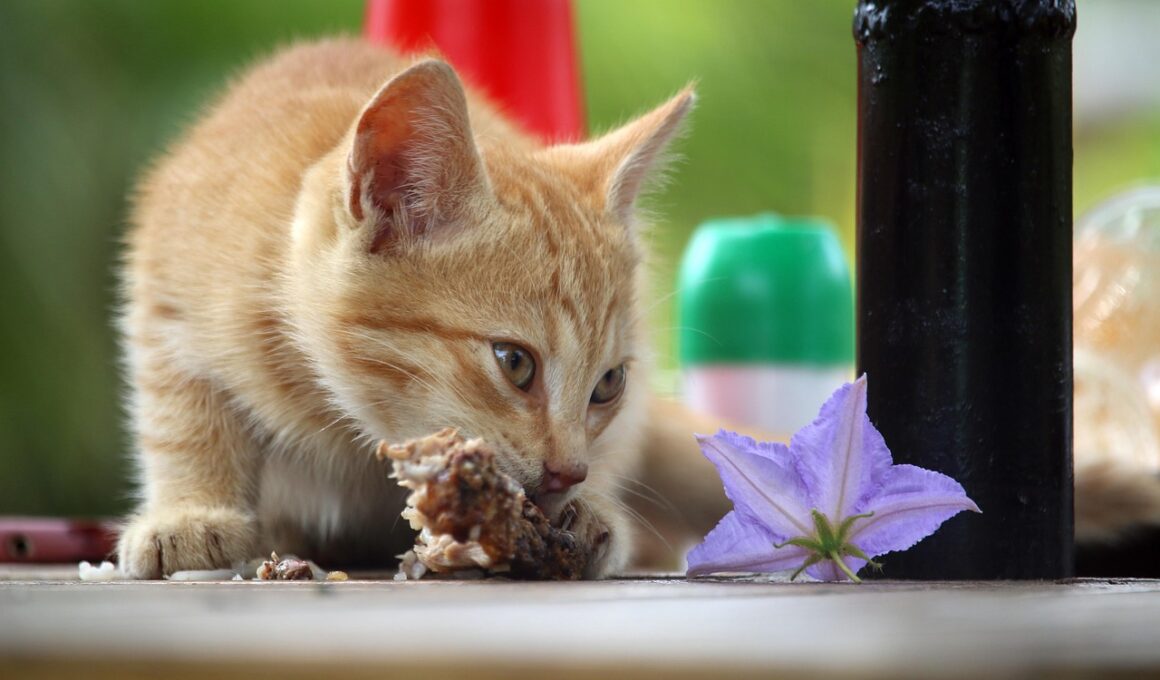Nutritional Needs of Growing Kittens: What to Feed for Optimal Health
Every kitten needs a balanced diet to grow up healthy and strong. Their nutritional needs are unique due to their rapid growth and development phases. Kittens require more protein, fats, vitamins, and minerals than adult cats. The right balance is crucial for their overall health and development. Kittens should consume premium quality kitten food rich in animal protein. This enhances muscle development and provides energy for their playful activities. Key ingredients include high-quality meat sources such as chicken, turkey, or fish. Compare ingredient lists carefully when selecting kitten food. It’s also essential to choose a food that contains adequate calories to support their high activity levels, especially in the first year of life. To promote optimal growth, it may be beneficial to consult with a veterinarian regarding dietary choices. They can provide advice on feeding schedules, transitioning from milk to solid food, and addressing any specific health concerns. The goal is to foster a foundation for lifelong health through proper nutrition from an early age. Regular monitoring of their weight will help maintain good health throughout their growth stages.
As your kitten transitions from mother’s milk to solid food, ensure the gradual introduction of new foods. Start by blending wet kitten food with a little warm water to create a soft consistency, then slowly reduce water. This method prevents digestive upset caused by sudden changes in diet. Incorporating both wet and dry food can help prevent dental issues later. Wet food provides hydration and is often more palatable, while dry food helps control plaque buildup. It’s essential to choose high-quality products designed specifically for kittens, as these contain the necessary nutrients to support their rapid growth. Look for brands that have undergone rigorous testing for safety and quality. Pay attention to any feeding guides on packaging to avoid overfeeding. Kittens can be prone to obesity, affecting their overall health. Adjust portion sizes based on their age, activity level, and breed. Regular veterinary check-ups will ensure they are growing at a healthy rate and receiving adequate nutrition. Feeling overwhelmed by choices? Online resources and kitten feeding guides can provide direction on specific brands and ingredients that deliver optimal nutrients and health support.
Importance of Water Intake
Hydration is just as crucial as nutrition for your kitten’s health. Cats, including kittens, have a low thirst drive. Therefore, it’s significant to provide fresh and clean water at all times. Many kittens will derive some moisture from wet food, but they still need access to water. Consider providing a pet water fountain to encourage drinking, as many cats prefer sipping from moving water. This can stimulate their interest in staying hydrated. Monitor your kitten’s drinking habits to establish a baseline. If you notice any changes, such as drinking more or less than usual, consult your veterinarian. Maintaining hydration helps prevent urinary tract issues that are prevalent in adult cats. In addition, proper hydration supports kidney function and aids digestion. If you decide to keep your kitten primarily on dry food, it’s especially important to be vigilant about their water intake. Total daily fluid intake should be adequate according to your kitten’s age and weight. A well-rounded diet and consistent water availability will ensure happy, healthy kittens with a vibrant energy to play and explore.
Incorporating supplements can also be beneficial in ensuring that your kitten receives proper nutrition. Consult with your veterinarian before introducing any supplements, as the needs may differ based on individual health requirements. Probiotics can enhance gut health and improve digestion. They are particularly useful if your kitten has experienced any digestive issues. Omega fatty acids increase cognitive function and support healthy skin and coat. Nutritional supplements exist for specific health concerns, such as joint support, energy boosters, and digestive aids. However, it’s critical to remember that a balanced diet should meet most of your kitten’s nutritional needs without excessive supplementation. Over-supplementing can lead to health issues, impacting your kitten’s overall wellbeing. Always refer back to professional guidance to navigate through supplements efficiently. Proper nutrition is a lifelong commitment. As your kitten matures, their dietary requirements will evolve, so continuous learning about feline nutrition is advantageous. Invest time in understanding how to transition to adult cat food at the appropriate age to maintain their health, vitality, and longevity as they grow into adulthood.
Recognizing Good Dietary Practices
Recognizing good dietary practices is essential. Start by observing your kitten’s feeding behavior and eating habits. A healthy kitten is typically enthusiastic at mealtime, and they easily finish their meals without leaving excessive leftovers. This indicates that they are receiving adequate nutrition. Regularly monitor your kitten’s weight and growth rates against breed standards to avoid health issues such as obesity or malnutrition. Feeding frequency should be appropriate for their age; younger kittens may require feeding four to five times a day. As they approach adulthood, you can gradually reduce this to twice. Create a routine to establish a sense of security in eating habits. Be cautious about feeding human food to your kitten; many human foods can be harmful. Foods such as chocolate, onion, garlic, and certain dairy products can pose serious health risks. Instead, reward your kittens with treats designed for their species. These will meet both their nutritional needs and satisfy their cravings. Good dietary practices involve attention, consistency, and educating yourself about your kitten’s evolving nutritional needs as they grow.
Understanding the transition from kitten food to adult cat food is a significant milestone in your kitten’s nutritional journey. Generally, this transition occurs around the age of one year. Gradually introduce adult food over a week to avoid digestive upset. Start by mixing a small amount of adult food with their remaining kitten food, increasing the proportion of adult food over time. It is crucial to select high-quality adult food that reflects your cat’s unique health and dietary requirements. Aim for food that maintains their energy levels, promotes a shiny coat, and supports overall health. Watch for any signs of food intolerance during the transition. If your kitten experiences gastrointestinal disturbances or other negative reactions, consult your veterinarian immediately. Adult cat food must meet the changing energy needs as they continue growing and maturing. Adjustments may be necessary based on activities or any new health considerations. By planning a balanced diet transitioning efficiently from kitten to adult food, you help maintain health and vitality throughout their life in an ever-changing landscape of nutrition needs.
Conclusion
In conclusion, providing kittens with a nutritious diet is essential for their growth and overall health. The right combination of proteins, fats, vitamins, and minerals lays the foundation for a healthy future. Ensure their food is specially formulated for kittens and consult with veterinarians as needed. Regular check-ups will keep your kittens healthy and allow you to address nutritional concerns promptly. Always keep fresh water available and monitor their hydration. As your kittens grow, adapt their diet according to their changing health needs. The goal is to establish healthy eating habits and nutrition practices from kittenhood that will last a lifetime. Select high-quality food, pay attention to feeding practices, and recognize any dietary changes or concerns. This will foster a happy and healthy life for your feline friends. Investing in their nutritional needs now is crucial for ensuring that they live a long, vibrant, and fulfilling life. With the right care, nutrition, and love, your kittens will flourish and become strong companions. Always remain educated about feline dietary needs to continue offering the best care for your beloved pets.
Practical Suggestions for Implementing Healthy Diets
Incorporating practical suggestions into your kitten’s feeding routine can enhance their health benefits significantly. Begin by sticking to a feeding schedule that establishes consistency. Kittens thrive on routine, making it more likely that they will eat properly. Keep their feeding area clean and comfortable. A relaxed environment can aid in managing their anxiety during meal times. You could also try different food textures and flavors to find their favorites. Monitor their reactions and preferences, but always choose kitten-specific diets. If you find your kitten shows little interest in eating, consider warm food options or adding a sprinkle of palatable toppings; this can encourage them to eat. Training should also accompany feeding time; use their dry food as a reward during training to develop a positive approach to their meals. Lastly, keep mental stimulation in mind! Engage your kittens in play before meals to allow them to settle down when it’s feeding time. Checking to ensure that any changes in appetite or eating habits are monitored underscores the importance of remaining vigilant throughout their development and health journey.


